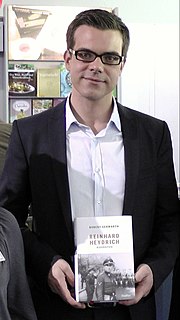
Ernst Kaltenbrunner was a high-ranking Austrian SS official during the Nazi era and a major perpetrator of the Holocaust. After the assassination of Reinhard Heydrich in 1942, and a brief period under Heinrich Himmler, Kaltenbrunner was the third Chief of the Reich Security Main Office (RSHA), which included the offices of Gestapo, Kripo and SD, from January 1943 until the end of World War II in Europe.

Reinhard Tristan Eugen Heydrich was a high-ranking German SS and police official during the Nazi era and a principal architect of the Holocaust.
Sicherheitsdienst, full title Sicherheitsdienst des Reichsführers-SS, or SD, was the intelligence agency of the SS and the Nazi Party in Nazi Germany. Established in 1931, the SD was the first Nazi intelligence organization and the Gestapo was considered its sister organization through the integration of SS members and operational procedures. The SD was administered as an independent SS office between 1933 and 1939. That year, the SD was transferred over to the Reich Security Main Office, as one of its seven departments. Its first director, Reinhard Heydrich, intended for the SD to bring every single individual within the Third Reich's reach under "continuous supervision".
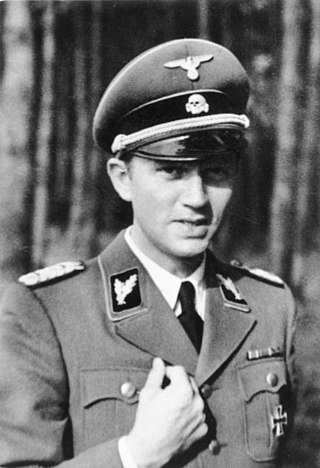
Walter Friedrich Schellenberg was a German SS functionary during the Nazi era. He rose through the ranks of the SS, becoming one of the highest ranking men in the Sicherheitsdienst (SD) and eventually assumed the position as head of foreign intelligence for Nazi Germany following the abolition of the Abwehr in 1944.
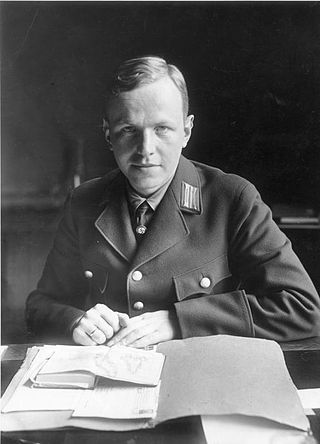
Achim Gercke was a German politician.

Heinrich Müller was a high-ranking German Schutzstaffel (SS) and police official during the Nazi era. For the majority of World War II in Europe, he was the chief of the Gestapo, the secret state police of Nazi Germany. Müller was central in the planning and execution of The Holocaust and attended the January 1942 Wannsee Conference, which formalised plans for deportation and genocide of all Jews in German-occupied Europe—The "Final Solution to the Jewish Question". He was known as "Gestapo Müller" to distinguish him from another SS general named Heinrich Müller.

The Blomberg–Fritsch affair, also known as the Blomberg–Fritsch crisis, was the name given to two related scandals in early 1938 that resulted in the subjugation of the German Armed Forces (Wehrmacht) to dictator Adolf Hitler. As documented in the Hossbach Memorandum, Hitler had been dissatisfied with the two high-ranking military officials concerned, Werner von Blomberg and Werner von Fritsch, regarding them as too hesitant with the war preparations he demanded. As a result, a marriage scandal and a manufactured accusation of homosexuality were used to remove Blomberg and Fritsch, respectively.

Arthur Nebe was a German SS functionary who was key in the security and police apparatus of Nazi Germany and from 1941, a major perpetrator of the Holocaust.
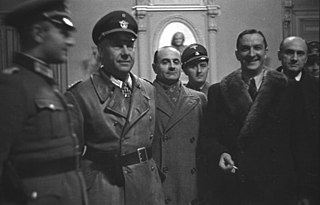
The Sicherheitspolizei, often abbreviated as SiPo, was a term used in Germany for security police. In the Nazi era, it referred to the state political and criminal investigation security agencies. It was made up by the combined forces of the Gestapo and the Kriminalpolizei between 1936 and 1939. As a formal agency, the SiPo was incorporated into the Reich Security Main Office (RSHA) in 1939, but the term continued to be used informally until the end of World War II in Europe.

Franz Walter Stahlecker was commander of the SS security forces (Sicherheitspolizei and the Sicherheitsdienst for the Reichskommissariat Ostland in 1941–42. Stahlecker commanded Einsatzgruppe A, the most murderous of the four Einsatzgruppen active in German-occupied Eastern Europe. He was fatally wounded in action by Soviet partisans and was replaced by Heinz Jost.

Karl Rudolf Werner Best was a German jurist, police chief, SS-Obergruppenführer, Nazi Party leader, and theoretician from Darmstadt. He was the first chief of Department 1 of the Gestapo, Nazi Germany's secret police, and initiated a registry of all Jews in Germany. As a deputy of SS-Obergruppenführer Reinhard Heydrich, he organized the World War II SS-Einsatzgruppen, paramilitary death squads that carried out mass-murder in Nazi-occupied territories.

Richard Bruno Heydrich was a German opera singer (tenor), composer, and founder of the Halle Conservatory. A talented musician since childhood, Heydrich would find great success as a musical teacher, through the Halle Conservatory, which he ran with his wife, Elisabeth. He was the father of high-ranking Nazi official Reinhard Heydrich, and SS officer who helped Jews escape the Holocaust, Heinz Heydrich, and Maria Heydrich.

Lina Mathilde Manninen was the wife of Reinhard Heydrich, head of the Reich Security Main Office and a central figure in Nazi Germany. The daughter of a minor German aristocrat, she joined the Nazi Party in 1929 and met Reinhard Heydrich in December 1930. The two wed on 26 December 1931 and had four children. After World War II ended, she published a memoir in 1976. She spoke with several authors, wrote letters of correction to many newspapers, and defended the reputation of her first husband (Heydrich) until her death at age 74 in August 1985 in Fehmarn.

Heinz Siegfried Heydrich was the son of Richard Bruno Heydrich and the younger brother of SS-Obergruppenführer Reinhard Heydrich. After the death of his brother in June 1942, Heinz Heydrich helped Jews escape the Holocaust.

Josef Albert Meisinger, also known as the "Butcher of Warsaw", was an SS functionary in Nazi Germany. He held a position in the Gestapo and was a member of the Nazi Party. During the early phases of World War II Meisinger served as commander of Einsatzgruppe IV in Poland. From 1941 to 1945 he worked as liaison for the Gestapo at the German embassy in Tokyo. He was arrested in Japan in 1945, convicted of war crimes and was executed in Warsaw, Poland.

Franz Josef Huber was an SS functionary who was a police and security service official in both the Weimar Republic and Nazi Germany. Huber joined the Nazi Party in 1937 and worked closely with Gestapo chief Heinrich Müller. After the German annexation of Austria in 1938, Huber was posted to Vienna, where he was appointed chief of the Security Police (SiPo) and Gestapo for Vienna, the "Lower Danube" and "Upper Danube" regions. He was responsible for mass deportations of Jews from the area. After the war ended, Huber never served any prison time. He was employed by the West German Federal Intelligence Service from 1955–64. He died in Munich in 1975.

This is a list of books about Nazi Germany, the state that existed in Germany during the period from 1933 to 1945, when its government was controlled by Adolf Hitler and his National Socialist German Workers' Party. It also includes some important works on the development of Nazi imperial ideology, totalitarianism, German society during the era, the formation of anti-Semitic racial policies, the post-war ramifications of Nazism, along with various conceptual interpretations of the Third Reich.

Friedrich Uebelhoer was a German politician and official with the Nazi Party.
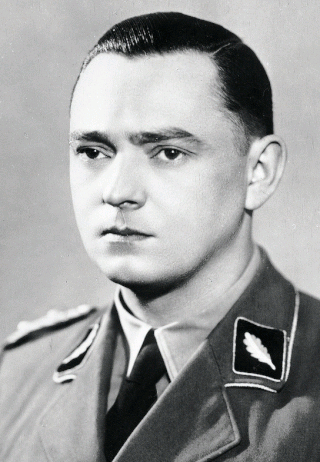
Horst Böhme was a German SS functionary during the Nazi era. He served in the SD, the intelligence service of the SS, and was a leading perpetrator of the Holocaust.

Adolf Hitler, the dictator of Nazi Germany, initiated World War II in Europe with the invasion of Poland in September 1939 and was central to the Holocaust. He was hated by his persecuted enemies and even by some of his own countrymen. Although attempts were made to assassinate him, none were successful. Hitler had numerous bodyguard units over the years which provided security.
